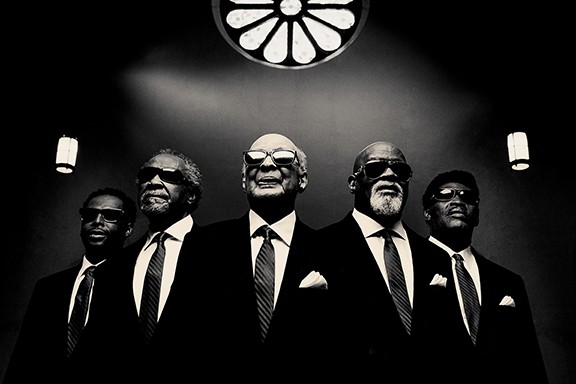The Blind Boys of Alabama are celebrating 80 years as a band, having persevered through challenges of color barriers, being separated from their families as children, the death of band mates and, of course, living without the sense of eyesight.
Jimmy Carter, who at age 87 is the sole surviving member of that original group that got its start in 1939 at the Alabama Institute for the Negro Blind in Talladega, Alabama, is the indominable spark that keeps the band's name and music alive.
Carter, and fellow Blind Boys Eric "Ricky" McKinnie, Ben Moore and Paul Beasley (who are also blind), and Joey Williams, Stephen Raynard Ladson and Peter Levin will be hitting Tucson to spread some holiday cheer next week.
The group—which has garnered a mountain of accolades and awards, including five Grammy Awards, four Dove Awards, and a Gospel Music Hall of Fame induction—played at civil-rights events alongside Martin Luther King Jr. and played for three sitting presidents: Bill Clinton, George W. Bush, and Barack Obama.
The list of performers Carter and the Blind Boys have worked with is a virtual Who's Who of contemporary music: George Clinton, Chrissie Hynde, Tom Waits, Prince, Mavis Staples, Willie Nelson, K.D. Lang, Lou Reed, Randy Travis, Taj Mahal, Keb Mo, Aaron Neville, Tom Petty, Toots Hibbert, Allen Toussaint, William Bell and more.
The group had success with their first single, "I Can See Everybody's Mother but Mine," on the Veejay Label in 1948. More hits would come over the next quarter-century.
Beginning in 2002, more contemporary artists gravitated to the Blind Boys, and one, Peter Gabriel, put them on his Real World Label with the release of their 52nd album, Spirit of the Century, which won the group's first-ever Grammy Award.
The band's latest release (among no fewer than six dozen studio and live releases), Work to Do, dropped in August. It's the second collaboration with long-time gospel and Blind Boys fan Grammy artist Marc Cohn ("Walking in Memphis") and producer John Leventhal, a five-time Grammy winner in his own right.
Tucson Weekly spoke by phone with Carter from his Birmingham home.
What has been the key to staying on the gospel side and not being tempted by secular music?
Blind Boys of Alabama started out as young people, but we were taught in a Christian environment. We said no matter what, we weren't going to deviate from what we were taught. We just love to sing gospel, and we gonna stay there as long as we can.
Your fame took an upward projectory when you began covering songs like Tom Waits' "Down in the Hole" and others with which you gave a gospel translation. Your longtime manager Charles Driebe made some major industry connections, but what prompted others interest with you?
We found out these people wanted to do stuff with us. So, it worked out real well. That's how the origin of that started.
What started your journey into gospel music, and how did your blindness affect that choice?
I feel I was called to do this work. My parents were the parents of six boys, and the only one that was blind was me. So, I wondered then why that was, and now I know why.
The Blind Boys may stand alone with a longevity that is beginning its eighth decade. Could you have thought back in 1939 this was possible?
I had no idea when we started out in Alabama, it would be nothing like this. We didn't want no accolades, we just wanted to get out and sing gospel music. God blesses us—we got five Grammys, a lifetime achievement award. That's why we want to keep going, until he says "that's enough."
You have toured a lot during the holidays in recent years. This year, you have a break during the week of Christmas. What do you look forward to the most?
I'm gonna eat as much turkey and gravy as I can eat. I won't be seein' no more for a while.
When it comes to the shows, you seem to rise to the occasion, which includes the encore of walking through among the audience and singing. Where does that experience rank?
That's the highlight of the show. I love that, I love people. I want people to know how I feel about them. That's my greatest treasure when I go out and mingle with the people.


